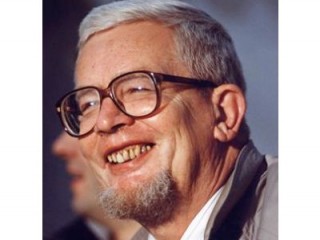
Sven Delblanc biography
Date of birth : 1931-05-26
Date of death : 1992-12-15
Birthplace : Swan River, Manitoba, Canada
Nationality : Swedish
Category : Famous Figures
Last modified : 2011-10-11
Credited as : fantastic author, professor of literature,
0 votes so far
Sven Delblanc was born in Swan River, Manitoba, Canada, the third child of an immigrant family. In 1935 the family returned to their native country to live in a village in southern Sweden. Delblanc was raised in rural Vagnhärad, Södermanland. After graduating from the secondary school, he studied at the University of Uppsala, receiving his Ph. D. in 1965. His doctoral thesis, ÄRA OCH MINNE (1965), dealt with the Swedish 18th century literature. Later he returned to the period in his fiction. Delblanc worked the as docent in comparative literature in Uppsala and a visiting professor in Berkeley, California. Up to mid-1970s Delblanc combined his writing career with university teaching. One of his scholarly achievements was the literary history DEN SVENSKA LITTERATUREN (1987-1990), which he coedited with Lars Lönnroth.
As a novelist Delblanc made his debut with the experimental EREMITKRÄFTAN (1962), which deals with the problem of submission, a central theme in the author's work. The protagonist of the story, Axel Weber, is in many respects Delblanc's alter ego. He tries to escape from the oppressive conditions of a society, in which citizens live like prisoners. He finds freedom in The White City, where people do what they want. Disillusioned, he returns to the Prison. Eventually he finds security in marriage and dreams of personal liberty and cooperation. "Only through the lack of freedom can we become humans," is the conclusion.
In the 1960s Delblanc's novels were inspired by radical movements in the U.S. and his California trip. In his political satire, HOMUNCULUS (1965), CIA and KGB chase Sebastian, an unemployed chemistry teacher, in Stockholm. Sebastian has managed to create a homunculus, a little man. In NATTRESA (1967) the conflict between society and individual leads to rebirth. "Come to us; we have a task for you," he is told by his activist partner. Thus Axel escapes from the temptations of an Orwellian 'big brother' organization, the San Francisco-based Brotherhood. Delblanc's revolutionary message is clear: "No outrage is meaningless." In Prästkappan the dreams of the protagonist, Hermann is crushed by Frederick the Great – Delblanc's view of the world was pessimistic as a rule. Hermann meets one defeat after another. ÅSNEBRYGGA (1969) was a diary novel, an fictionalized account of a guest professorship at the University of California at Berkeley. It was the year of student revolutions, Richard Nixon was president and Ronald Reagan had been elected two years earlier governor of California. Delblanc goes through his impressions of student revolt and other aspects of American society, which he finds tainted by fascism. He sees Nixon as Nicholas II, the last czar of Russia.
In the 1970s appeared semiautobiographical, ironic Hedeby series, including ÅMINNE (1970), STENFÅGEL (1973), VINTERRIDE (1974) and STADSPORTEN (1976). The novels, set on a small community shortly before and during World War II, were also adapted into a popular mini-series for television under the title Hedebyborna. Although Delblanc's narrativ technique was complex, he had abandoned experimentalism familiar from his earlier works, and gave an account of the vanished way of life in small town Sweden. Delblanc' alter ego, Axel Weber, finds a safe harbor in his inner world. Feminist themes Delblanc pondered in GROTTMANNEN (1977), which was received coldly, JERUSALEMS NATT (1983), which pays attention to the fact, that the authors of the Gospels were male, and in KÄRA FARMOR (1979), in which woman rules the world as a matriarch of infinite power and strength. This novel was partly based on his father's family. Grottmannen attacked sexist cultural circles around the Stockholm Film Institute.
In the 1980s Delblanc started another series with SAMUELS BOOK (1981), which received the prestigious Nordic Literature Prize. It was followed by SAMUEL DÖTTRAR (1982), set in the early 1920s, KANAANS LAND (1984), and the final volume MARIA ENSAM (1985). The semidocumentary novels dealt with Delblanc's family history, his maternal grandfather, his descendants, and a hereditary stain of mental illness. Samuels Book focused on the writer's grandfather, here called Samuel Eriksson, who was ordained a Lutheran minister in the Unites States, but was never accepted in Sweden. He died insane. Delblanc used his diary and case record. (See other Swedish emigration series: Vilhelm Moberg) Samuel's daughter Maria, trained as a teacher, marries a Swedish American man, Fredrik Weber, and moves to Canada, the land of Canaan, where the writer himself was born. After a series of hardships, Maria loses her religious faith. in Maria ensam she returns to Hedeby, which is no paradise. Maria's husband is violent, the marriage ends, and she eventually commits suicide believing she was a bad wife and mother. Her youngest son is Axel Weber, who breaks out from his shell.
Other historical novels include KASTRATER (1975), which featured in its cast of characters the great soprano castrato Luigi Marchesi, the besotted sometime "Bonnie Prince Charlie", and Gustaf III of Sweden, who stays incognito in Rome. Delblanc argued, that only art can liberate mankind's longing from its physical circumstances. SPERANZA (1980) depicted the journey of a slave ship across the Atlantic ocean. The narrator is Malte Moritz von Putbus, and idealist, who succumbs to the evil within
himself.
Delblanc's plays include television drama MORGONSTJÄRNAN (1977) which did not give a very flattering portrait of the ruling aristocracy in the mid-18th-century. ROBOTBAS (1963) was about love and politics, and DEN ARME RICHARD, a stage play about Richard Strauss, had its premiere in 1978. Delblanc has also written essays and memoirs LIVETS AX (1991), in which he tries to understand his tyrannical father, AGNAR (1992), about his teenage years, and SLUTORD (1993). Delblanc died in Uppsala on December 15, 1992 – a few years earlier he had heard that he had incurable cancer.
















